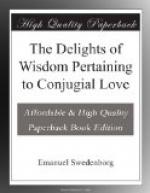PARTNER.—Those who have lived in love truly conjugial, after the death of their married partners, are unwilling to enter into iterated marriages, the reason why, 321. See Married Partners.
PATHOLOGY, 253.
PEACE is the blessed principle of every delight which is of good, 394. Peace, because it proceeds immediately from the Lord, is one of the two inmost principles of heaven, 394. Peace in their homes gives serenity to the minds of husbands, and disposes them to receive agreeably the kindnesses offered by their wives, 285. Peace is in conjugial love, and relates to the soul, 180.
PEGASUS.—By the winged horse Pegasus the ancients meant the understanding of truth, by which comes wisdom; by the hoofs of his feet they understood experiences, whereby comes natural intelligence, 182.
PELLICACY, 459, 460, 462.
PERCEPTION, common, is the same thing us influx from heaven into the interiors of the mind, 28. By virtue of this perception, man inwardly in himself perceives truths, and as it were sees them, 28. All have not common perception, 147. There is an internal perception of love, and an external perception, which sometimes hides the internal, 49. The external perception of love originates in those things which regard the love of the world, and of the body, 49.
Obs.—Perception is a sensation derived from the Lord alone, and has relation to the good and true, A.C. 104. Perception consists in seeing that a truth is true, and that a good is good; also that an evil is evil, and a false is false, A.C. 7680. Its opposite is phantasy. See Phantasy, obs.
PEREGRINATIONS of man in the societies of the spiritual world, during his life in the natural world, 530.
PERIODS whereby creation is preserved in the state foreseen and provided for, 400, 401.
PERIOSTEUMS, 511.
PETER, the Apostle, represented truth and faith, 119.
PHANTASY, 267.—Those are in the phantasy of their respective concupiscences who think interiorly in themselves, and too much indulge their imagination by discoursing with themselves; for these separate their spirit almost from connection with the body, and by vision overflow the understanding, 267. What is the fate of those after death who have given themselves up to their phantasy, 268, 514. Errors which phantasy has introduced through ignorance of the spiritual world and of its sun, 422.
Obs.—Phantasy is an appearance of perception: it consists in seeing what is true as false, and what is good as evil and what is evil as good, and what is false as true, A.C.. 7680.
PHANTOMS.—Who those are who in the other life appear as phantoms, 514.
PHILOSOPHERS, difference between, and Sophi, 130. The ancient people, who acknowledged the wisdom of reason as wisdom, were called philosophers, 180. See Sophi.




